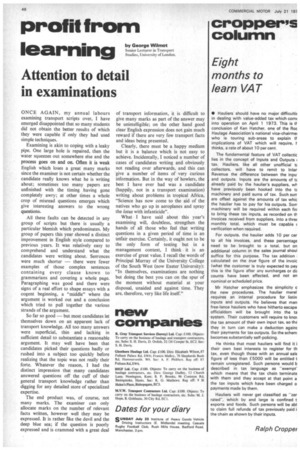profit from learning
Page 48

If you've noticed an error in this article please click here to report it so we can fix it.
Attention to detail in examinations
by George Wilmot
Senior Lecturer in Transport Studies, University of London.
ONCE AGAIN, my annual labours examining transport scripts over, I have emerged disappointed that so many students did not obtain the better results of which they were capable if only they had used simple techniques.
Examining is akin to coping with a leaky pipe. One large hole is repaired, then the water squeezes out somewhere else and the process goes on and on. Often it is weak English which loses a great many marks since the examiner is not certain whether the candidate really knows what he is writing about; sometimes too many papers are unfinished with the timing having gone completely awry; at other times a whole crop of misread questions emerges which give interesting answers to the wrong questions.
All these faults can be detected in any group of scripts but there is usually a particular blemish which predominates. My group of papers this year showed a distinct improvement in English style compared to previous years. It was relatively easy to comprehend and understand what the candidates were writing about. Sentences were much shorter — there were fewer examples of those complex sentences containing every clause known to grammarians and covering a whole page. Paragraphing was good and there were signs of a real effort to shape essays with a cogent beginning, a "middle" where the argument is worked out and a conclusion which tried to pull together the various strands of the argument.
So far so good — but most candidates let themselves down on an apparent lack of transport knowledge. All too many answers were superficial, thin and lacking in sufficient detail to substantiate a reasonable argument. It may well have been that candidates picked their questions badly or rushed into a subject too quickly before realizing that the topic was not really their forte. Whatever the reason, I had the distinct impression that many candidates answered questions off the cuff of their general transport knowledge rather than digging for any detailed store of specialized expertise.
The end product was, of course, not many marks. The examiner can only allocate marks on the number of relevant facts written, however well they may be expressed. It is rather like the devil and the deep blue sea; if the question is poorly expressed and is crammed with a great deal of transport information, it is difficult to give many marks as part of the answer may be unintelligible; on the other hand good clear English expression does not gain much reward if there are very few transport facts and ideas being presented.
Clearly, there must be a happy medium but it is a balance which is not easy to achieve. Incidentally, I noticed a number of cases of candidates writing and obviously not reading over afterwards, and this can 'give a number of items of very curious information. But in the way of howlers, the best I have ever had was a candidate (happily, not in a transport examination) writing about problems in tropical Africa, "Science has now come to the aid of the natives who go up in aeroplanes and spray the lotus with infanticide".
What I have said about this year's examining will, doubtless, strengthen the hands of all those who feel that writing questions in a given period of time is an Unfair exercise. Certainly, it ought not to be the only form of testing but in a management context, I think it is an exercise of great value. I recall the words of Principal Murray of the University College of the South West (now Exeter University): "In themselves, examinations are nothing but doing the best you can on the spur of the moment without material at your disposal, unaided and against time. They are, therefore, very like life itself."




























































































